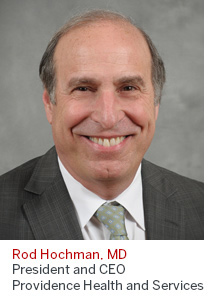Auto logout in seconds.
Continue Logout This interview with Rod Hochman, the President and CEO of Providence Health & Services, was conducted by Eric Larsen, Managing Partner, and condensed by Juliette Mullin.
This interview with Rod Hochman, the President and CEO of Providence Health & Services, was conducted by Eric Larsen, Managing Partner, and condensed by Juliette Mullin.
Q: How did you transition from physician to hospital executive?
Hochman: Here's the thing: You never make the switch. It's a lifelong process that you go through.
Thirty-five years ago, I graduated from Boston Medical School. I'd known I wanted to be a doctor going back to when I was in high school, but you go through this whole process figuring out how you can best serve as a physician.
At the Guthrie Clinic, we had to run our own business. We had some professional managers, but clinicians there are managers, so I played a significant role in operations and management early on, and ensuring that our resources were effectively supporting the care we provided our patients. I was the youngest board member in the history of the Guthrie Clinic and they had a very democratic process: You got one vote for every year you were at the clinic.
So at a very early age, in my late 20s, we made some tough decisions that I learned from. That teaches you more than getting your MBA.
The progression from being a physician to being a CEO, for me, was organic. Every day, I was both a physician and executive leader; and I was lucky to have mentors and colleagues who were willing to say, "OK, let me give you a chance at doing that."
What an aspiring clinician leader should know: A few words of advice
Q: What advice would you give today to an aspiring physician leader?
Hochman: I always like to think in terms of clinician leaders. We even changed our strategic plan at Providence Health & Services: We used to talk about great relationships with physicians, but now it's about our relationship with clinicians. That's our nurses, our pharmacists, our physician assistants... It's all the people who touch patients and determine their direction of care.
So I think for clinicians who are asking, "Ok, how do I move on to the business platform and leadership side of health care," the response is: What are you doing to prepare?
“You've got to get your executive MBA. You've got to punch that ticket in some way.”
It's different today than it was 20 or 30 years ago. Today, I'd recommend to all of them: You've got to get your executive MBA. You've got to punch that ticket in some way.
Then what you need to do is be in an organization with an environment that's willing to put you into jobs and positions so you can hone your skills. You need to be able to run a clinic, or be able to direct a program, or be part of a strategy council. In other words, you need to be in an organization that understands the necessity and value of developing physician and clinician leaders.
Also, get a mentor early – really early – on in your career. Maybe one, maybe two, maybe three.
Some of the mentors that I've had are from leadership consulting firms and some are people like [Dignity Health CEO] Lloyd Dean. I've also always tried to have CEO mentors that are outside of health care because they have a unique perspective. I keep around me a council of probably five or six different people who I can pick up the phone, talk to, and say, "Can you help me think through this?" At an early age, get some of those people around you who can help you make decisions. And, as you advance in your career, provide that same mentorship to clinicians just starting out.
Finally, have a willingness to take on a lot and realize that you're going to have to do some grunt work along the way.
Next: Hochman on market consolidation & disruptive innovation
And it's never too early to start grooming a great manager. See our Succession Management Implementation Guide to ensure you deliberately chose your future leaders—don’t let circumstances choose them for you.
Don't miss out on the latest Advisory Board insights
Create your free account to access 1 resource, including the latest research and webinars.
Want access without creating an account?
You have 1 free members-only resource remaining this month.
1 free members-only resources remaining
1 free members-only resources remaining
You've reached your limit of free insights
Become a member to access all of Advisory Board's resources, events, and experts
Never miss out on the latest innovative health care content tailored to you.
Benefits include:
You've reached your limit of free insights
Become a member to access all of Advisory Board's resources, events, and experts
Never miss out on the latest innovative health care content tailored to you.
Benefits include:
This content is available through your Curated Research partnership with Advisory Board. Click on ‘view this resource’ to read the full piece
Email ask@advisory.com to learn more
Click on ‘Become a Member’ to learn about the benefits of a Full-Access partnership with Advisory Board
Never miss out on the latest innovative health care content tailored to you.
Benefits Include:
This is for members only. Learn more.
Click on ‘Become a Member’ to learn about the benefits of a Full-Access partnership with Advisory Board
Never miss out on the latest innovative health care content tailored to you.
